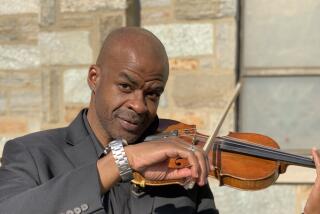VIOLINIST EARL CARLYSS SAYS GOODBY
This summer, Earl Carlyss will say farewell to the Juilliard String Quartet after nearly 21 years as second violinist. After that, it just won’t be the same without him.
At least Carlyss is fervently hoping it won’t.
For the record:
12:00 a.m. Feb. 9, 1986 IMPERFECTIONS
Los Angeles Times Sunday February 9, 1986 Home Edition Calendar Page 99 Calendar Desk 2 inches; 53 words Type of Material: Correction
For sure, there was a recent earthquake Back East, but Johns Hopkins University and its prestigious Peabody Institute are still securely fastened to the shores of Chesapeake Bay in Baltimore, not in New York, where Marc Shulgold misplaced it his Jan. 23 article on Juilliard Quartet violinist Earl Carlyss. Krisanthy Desby of Hollywood, a ’79 graduate of Peabody, knew this.
“There is no way the group will be worse with Joel (Joel Smirnoff, the second-violinist elect), and it might in fact be better. Any quartet is good because it has a point of view. Each one is different--and the new Juilliard will be different.”
The “old” Juilliard visits Ambassador Auditorium tonight and Saturday, marking Carlyss’ final visit here as a member of one of the premier quartets in the world. Why has he decided to leave?
“About 2 1/2 years ago,” he responds during a telephone conversation from Kansas City, “I started yearning to be home. I had received an offer to teach at the Peabody Institute (in New York, where his wife, pianist Ann Schein, is on the faculty). I agonized over it.
“All these years, the quartet had taken precedence over family. My girls are 12 and 15. If not now, when?”
The rigors of being a traveling musician are well known. Yet, the pleasures and profits of a successful touring quartet can be tantalizing.
“I am the most fortunate musician on the face of the earth, playing music with three wonderful colleagues,” he says. Several skeptics choose not to believe such sentiments, Carlyss notes with a hearty laugh. “More than one person has come up to me and asked, in all seriousness, ‘C’mon. What’s the real story?’ But honest to God, this is not personal. I’ve never had arguments with the others, and burnout was never an element. We are always searching. Playing is always a discovery.”
By means of example, Carlyss recalls a performance of a Mozart quintet: “Bobby (first violinist Robert Mann) and I had a disagreement over a particular tempo. We were to play it twice, so we decided to try it both ways, playing my way the first night. Midway through, I realized that I was wrong. And then, after the concert, Bobby came over and said, ‘Hey, y’know? That wasn’t bad.’ ”
Music-making was always fun and not even playing--pardon the pun--second fiddle bothered him. “I never had inferiority feelings,” he states unhesitatingly. “The role is different, but the importance is the same. I mean, which leg is most important in a chair?”
Way back in 1966, Carlyss became--much to his surprise--the fourth leg of the Juilliard chair. “I never thought they would consider me,” he recalls. “I had graduated from Juilliard the year before, where they told me they had noticed me. Hillyer (Rafael Hillyer, then violist) asked me to come over and play with them, but I knew there were a dozen players more experienced. I came loose as a goose, and they asked me back.
“Shortly after I was hired, we had our first rehearsal--it was on Dec. 23, I remember. Our first concert was Jan. 7. On that initial tour, which ended in May, we played 40 different quartets. It was a baptism of fire for me.
“But I had prepared myself at Juilliard. I hadn’t decided on anything back then. I had played everything: chamber, solo, orchestral (he was concertmaster with the New York City Ballet orchestra when the quartet hired him).”
Now, with a comfortable teaching post waiting at Peabody, will the violinist consider solo engagements? “I just love making music, in whatever form,” he answers. “My solo appearances may increase in the coming seasons. I would be happy with about 30 a year.”
Carlyss, 46, still approaches his profession with a boyish enthusiasm, even after 2,500 Juilliard Quartet concerts, by his count. “It’s more exciting now than in 1966,” he states. “I’ve grown. We’ve all changed. The music is bottomless.
“Recently, we had an open rehearsal at Michigan State. We were doing Beethoven’s Opus 131. It remains my favorite piece--my license plate says OPUS 131. Anyway, we sat there and played it straight through. Right in the middle I suddenly couldn’t imagine how anyone could write something like this.
“My last American concert (with the Juilliard) will be a Beethoven program at Carnegie Hall. Now, what could be better than that?”
More to Read
The biggest entertainment stories
Get our big stories about Hollywood, film, television, music, arts, culture and more right in your inbox as soon as they publish.
You may occasionally receive promotional content from the Los Angeles Times.










